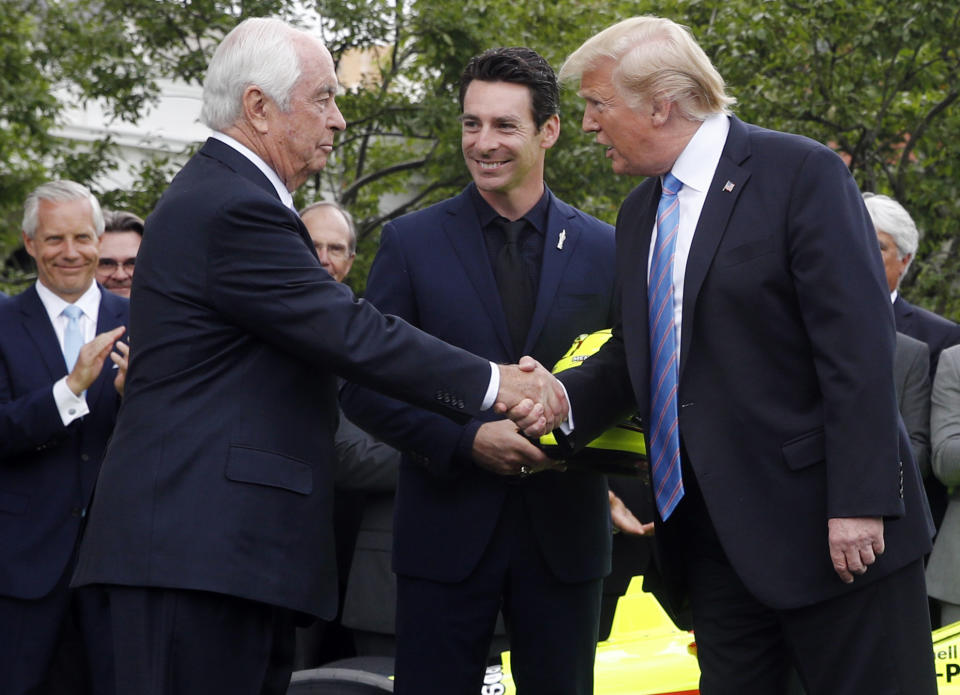Roger Penske on buying IndyCar Series: 'There's a chance to break some glass here'
Indianapolis Motor Speedway and the IndyCar racing series (including the iconic Indy 500) have been up for sale for over a year, an open secret in sports investment circles. On Monday, a buyer emerged: Roger Penske himself, the biggest business name in auto-racing.
Penske is buying IMS, IndyCar Series and IMS Productions (the speedway’s video business) from Hulman & Co., the family business that has owned IndyCar since 1945. The price tag was not disclosed, but SI.com reports that it is less than $1 billion. Bloomberg pegs Penske’s entire wealth at $1.2 billion.
The deal comes at a time when, contrary to the popular narrative of racing sports losing steam, IndyCar’s viewership rose 9% in the last year, the first year of a new TV contract with NBC Sports. (The 9% figure is based on viewership across NBC’s television and digital platforms.) But there are still questions about the appetite for racing sports amid widespread cord-cutting; Nascar ratings rebounded slightly this year after an all-time low in 2018. (IndyCar driver Scott Dixon recently told Yahoo Finance, “It is a difficult time, especially with the transition to streaming, right now there’s so many choices, so I think everybody is in a little bit of limbo to see what the direction is there.”)
Penske owns an eponymous Nascar racing team and an IndyCar racing team, and there are reasonable questions about whether Penske’s ownership of the entire IndyCar Series will represent a conflict of interest. “I’ve gotten that question once an hour over the last 24 hours,” Penske acknowledged in an interview on Tuesday with Yahoo Finance.
“Look, from my perspective, I’ve probably been a team owner in IndyCar longer than anyone else, and I’ve always been a strategist on the box, calling a race,” Penske continued. “I’m going to step back from that, just as I do in Nascar. I’m going to step back because this commitment I’ve made is much bigger than just running one team or one car on race day.”
In other words: Penske will remove himself from the pit box on race day, but he has no plans to sell his IndyCar racing team.
Penske does have big plans to grow the business and the popularity of the sport, and he plans to look to the NFL as a model.
“Hopefully, as we get together the teams with full transparency, we can get some ownership, as they have in NFL and other sports, that have associations and multiple locations to race in,” Penske says. “So I think there’s a chance to break some glass here in a positive way.”

Penske, widely known by his nickname “The Captain” in the racing world, visited the White House in June after Simon Pagenaud, a Team Penske driver, won this year’s Indy 500. Last month, he returned to the White House when President Trump honored Penske with a Presidential Medal of Freedom.
Recruiting team owners who come with their own real estate assets might be a tall order for a racing series that has never functioned anything like the big pro leagues, which have commissioners (rather than a single owner of the entire league, as Penske will be) and share league revenue among the franchise owners.
But Penske sees an advantage of IndyCar over other televised sports he resists naming. “We’re getting in at the right time,” he says. “So, quite different from some of the other sports, I think this is a business that has short races—the duration is key, the excitement. I look at the demographics in the pit area: lots of young people interested in this sport and I think that’s going to be key to our success, whether it’s on TV or radio or in social media or being at the event yourself.”
Pagenaud, in a visit to Yahoo Finance in May after winning the Indy 500, was similarly optimistic about young racing fans: “I see a lot of kids at the race track. The demographics are getting younger and younger, so it gives me a lot of hope for the future.”
—
Daniel Roberts is the sports business writer at Yahoo Finance. Follow him on Twitter at @readDanwrite.
Read more:
Joe Tsai buying Nets could usher in new era of foreign money in US sports
ESPN's Jay Williams: Why California's college athlete endorsement bill makes sense
Jay-Z defends his NFL deal: 'I think we have moved past kneeling'
Premier Lacrosse League has backing from NBC and Alibaba exec Joe Tsai
Jay Z will lead Puma’s return to basketball sneakers
Read the latest financial and business news from Yahoo Finance
Follow Yahoo Finance on Twitter, Facebook, Instagram, Flipboard, LinkedIn, YouTube, and reddit.


